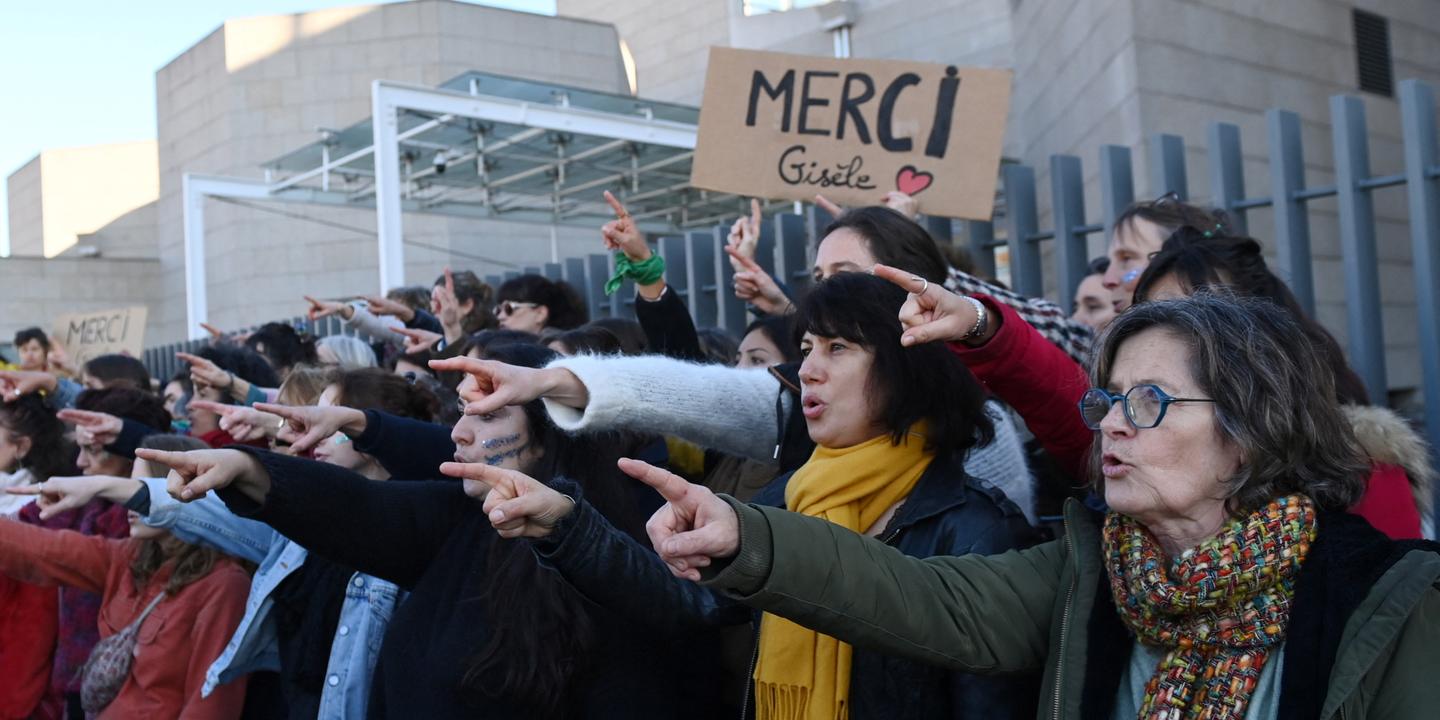Rape Trial Of 50 Defendants: France’s Case Sparks Outrage And Calls For Reform!
France's mass rape trial of Dominique Pelicot & 50 others reveals systemic failures, sparking outrage, protests, and calls for legal and societal reforms.

France is holding a trial for Dominique Pelicot and 50 accomplices. Charged for sexually assaulting and raping his former spouse Gisèle Pelicot for a decade, the case illustrates how much society remains a Patriarchal theatre for sexual violence and how it is not dealt with.
Being conducted in Avignon, the end of the trial reveals shocking moments of violence – Gisèle mentioned drugging and exploitation, while Dominique commits neat, detailed documentation. The first such case raises questions about legal safeguards and societal responsibility at a time when the world is fighting for justice on the International Day for the Eradication of Violence against Women.

Rape and Justice: An Overview of France’s Mass Trial
A 72-year-old man, Dominique Pelicot, appears in one of the most horrifying trials of modern France for organising the continued sexual abuse of his former wife, Gisèle Pelicot.
Although, over the course of more than 10 years, Dominique was putting drugs into the food and drinks that Gisèle was consuming, he did this without her knowledge and allowed at least 50 other men to rape her. More horrific in this case is the fact that Dominique never blurred the pictures or erased the faces of the victims but took his time to jot down details of the offences, the date of occurrence and any other person involved. The truth regarding Dominique and his predatory behaviour came out when he got arrested on charges of voyeurism of other women.
What is almost unimaginable about Gisèle’s story is revealed in this trial, as well as the deficiencies with which researchers studying systemic child abuse were and are confronted in discovering or even preventing it. It throws crucial presidential and legal responsibility concerned with the common good and justice for sexually violent acts and victims.

Avignon’s trial with Dominique Pelicot engaging 50 defendants is one of the most complex cases of sexual violence in the French legal records. The size of the trial is vast; several people are implicated in the systematic sexual assault and abuse of the former wife of Dominique, Gisèle Pelicot. All 50 co-defendants are accused of having assaulted the victims, with Dominique organising and recording the offences for over a decade.
Hence, this case has juridical relevance because it must be viewed as a chronicle of several organisational shortcomings in the prevention of sexual violence and gaps in the legislation with regard to consent and responsibility. The trial works as a reference to the fact that such criminal acts may persist unknown for decades, although all signs and proof are documented carefully by the offender. Its legal implications are equally deep, raising questions about sentencing, victim protection, and the broader societal attitudes toward gender-based violence.

As one of the biggest sexual violence trials in French history, it underlines the urgency for reforms in how such cases are investigated, prosecuted, and prevented. It also amplifies calls for greater awareness and stricter measures to ensure justice for victims and deterrence for perpetrators.
Societal Outrage: The Ripple Effect of France’s Mass Rape Trial
Outrage and protests have, in the recent past, been directed to the trial of Dominique Pelicot and 50 co-defendants who have provided a wake to gender-based violence and, more so, showing that French justice has not been protecting women from such atrocities.
The people of France, including activists, feminist organisations and citizens, have expressed their concern and anger, demonstrating at the Avignon court and other regions. First of all the protests are aimed at the nature of the crimes themselves and at the same time, the protesters express their dissatisfaction with the general attitude within society and within the legal frameworks that enable perpetrators of sexual violence to go scot-free.
The trial occurred just on the International Day for the Elimination of Violence Against Women and thus the feedback was even more articulated. Protests denounced high rates of sexual violence in France and demanded that authorities increase legislation rigour and extend more substantial rights and legal support to victims while raising public awareness of the issue.
Most activists were quick to add that this is not an isolated incident that has been conjured up purposely for the media but a true depiction of the world today that is synonymous with cross-border Black and Latinas exploitation.
It also echoed the compelling need for the reformulation of the concept of consent in the laws and other social relations. I understand the appalling nature of Dominique’s actions—snatching his ex-wife and then drugging her and organising her abuse—so he has brought into focus the suffering of victims and the modus operandi of how perpetrators easily slip through structural cracks. Such severity and depravity, plus the involvement of 50 co-accused, have increased demands for higher punishment for sexual offences from the victim and administrative measures to prevent such occurrences in the future.
The protests and discussions of the trial show the desire of people for fair punishment for the perpetrators as a desire to break the tradition of hushing up stories about gender-based violence. For a long time, this trial has now become a symbol of women’s advocacy, more so for the formulation of policies and acts that would see none of such horrors committed in the future.
The trial of Dominique Pelicot has renewed criticisms in France over the failures in the tackling of sexual violence in the country, both in law and the media. The case emphasises increased criminal consequences for Sexual crimes, elimination of pretrial obstacles, such as prohibitive statutes of limitations, and enhanced training for police and detectives in dealing with survivors.
At the same time, it has shed light on the fact that a culture of victim-shaming and society’s implicit endorsement of violence against women keeps victims from speaking up. Campaigners and feminists, in particular, have identified education approaches to bring about social change as far as the perception of consent and non–tolerance of sexual violence is concerned. These are some of the untouched issues that this trial has awakened to fight for justice and the dignity of survivors.
The Rape Survivor’s Voice: Strength Amidst Tragedy
Overcoming the fear and physical and sexual violations committed against them, many women, irrespective of their age, spotted a tough character in them; this spirit was evident in Gisel Pelicot during the mass rape trial in France. She decided to testify under a pseudonym to expose her abuses and fight for justice not only in her case but for other sexually attacked women as well.
She described the trial as a ‘trial of cowardice’ while addressing seven men as defendants out of 50 men who perpetrated the assaults that her ex-husband, Dominique Pelicot, planned. She complained that none of these men dealt with the crimes to the police since there was no consent, and she was unconscious.

Her statements were, for instance, “rape is rape”, and she challenged the accused persons to ask themselves why they never acted against the acts of crime they saw. Gisèle also emphasised that the act was also a personal violence that affected the whole society and moved on to say, “It’s time that the macho, patriarchal society that trivialises rape changes.” She is now a figure of feminism and women’s violence who fights for changes in society in the country, especially in France.
Rape Trial’s Legal and Cultural Implications
The arguments heard during the trial of Dominique Pelicot and 49 co-accused indicted for the crime seek to illustrate the deep underlying legal and social consequences of the case. Due to the harshness and frequency of his works, police law agencies are seeking the highest possible penalty, which is 20 years, for Dominique Pelicot.
Between 2011 and 2020, Pelicot administered substances to render his wife, Gisèle, unable to defend herself and then hired multiple men to sexually assault her. His misdeeds were corroborated in the pictures and videos taken before his arrest and produced in court.
Acting prosecutor Laure Chabaud stressed that the case must become a turning point in gender relations in France, explaining that even the maximum possible punishment can seem insufficient given the acts committed.

The trial also looks at the roles of the other defendants, aged between 26 and 74, who said they were tricked into thinking the encounters were consensual. It was suggested that some actually entered for-decoration-sake or for duress or pretended to have a mental illness, but psychological tests did not back up such claims. Prosecutors such as Jean-François Mayet pointed towards societal interests, stating that this case requires a shift in the interaction perspective, especially consent and responsibility.
The defence has all along concentrated more on the circumstances in as much as the defendants did not know that Gisèle did not consent. However, the prosecution has consistently destroyed all these arguments, asserting that the available evidence reveals premeditated involvement in acts of sexual violence. Measures for sentencing are now being done in what can be viewed as great detail to assess the offender for their worth and, at the same time, balance the fact that it’s the system’s need to restore justice that’s imperative to serving justice to society.
It is not just that this trial reminds the public of system failure. Still, it also invites important debate over the treatment of sexual violence and rape, the meaning of consent and the long shadow of patriarchal norms both in and outside the court of law.
)
The current trial of Dominique Pelicot has raised awareness of the severe absence of a coordinated response to the problem of systematic rape and sexual violence in France and the rest of the world. They revealed the gaps that exist in the perception of social issues, the legislation, and the justice systems to such kinds of crimes.
Even in the wake of increasing consciousness offered in part by #MeToo, it shows how deeply embedded patriarchy is in continuing violence and protecting the perpetrators. The trial exposes limitations in identifying and prosecuting cases of consent and irregularities in the so-called accused defence of misunderstanding or consent through deceit.
Additionally, such crimes have been unknown for nearly a decade and imply that the mechanisms that govern the protection of victims and the revealing of abuse are inefficient. The case remains a fresh reminder that there is much that needs to be done in terms of legal and societal reforms and cultural change, starting from the survivor-centric approach to addressing gender based violence and its root causes.
Public Reactions and Rape Protests
The Dominique Pelicot rape trial has elicited outrage and protests from the public and coincides with the protests against the menace against women all over the world. Every day, demonstrators meet near the Avignon courthouse to support Gisèle Pelicot; demonstrators applaud her and offer her flowers.

Bravery in insisting on a trial to be held in public has made her memorable among the French women who later painted her bob hairstyle and round sunglasses. Protests have emerged across the nation as people have become increasingly sick of rape culture and institutionalised misogyny.
In connection with the observance of the International Day for the Elimination of Violence Against Women, the trial added an international dimension. Feminist groups seized this moment to call on French legislators to alter the definition of rape in concert with European countries’ consent-based definition.
Greens senator Mélanie Vogel, who suggested consensual rape legislation last year, said, “Society has already accepted that the difference between sex and rape is consent. Criminal law, however, has not.”

Feminist activists intended to go topless in the major cities of Argentina to protest against gender-based violence, and the police remained passive as the demonstrators demanded change. This trial and its public engagement increased pressure and, amplified campaigns for change and shifted the discursive limits of society and law concerning consent, misogyny and sexual violence.
Call to Action: A Global Stand Against Rape Culture
The Dominique Pelicot trial shows why there should be a structural approach to eliminating all cases and giving justice to the survivors of abuse and rape. This leading case demonstrates the need to challenge sexualised culture and produce cultural and legal transformations that can move academic, legal, and social institutions toward valuing consent and accountability.
Activists, feminist organisations, and policymakers are mobilising to change France’s laws. They are demanding a consent-based definition of rape and better support systems for survivors. These efforts are aimed not only at preventing such crimes in the future but also at creating a society in which survivors are empowered, perpetrators are held accountable, and violence against women is unequivocally condemned. The trial stands as a wake-up call, calling for collective action to dismantle rape culture and build a safer, more equitable world.





